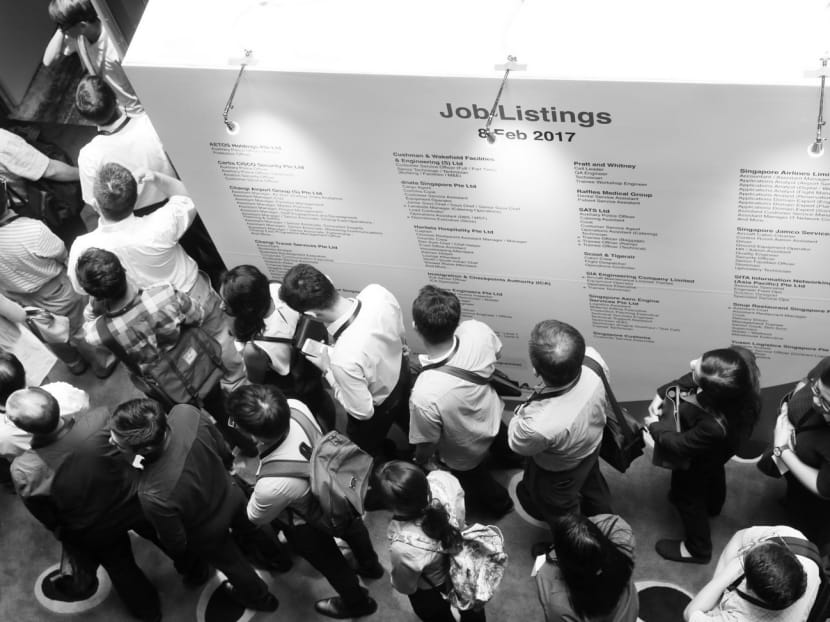Time for Singapore to embrace a freelance, contract workforce
Contingent labour is on the rise. According to the Manpower Ministry’s 2015 Labour Force Report, there were 202,400 contract employees in Singapore, forming 11.3 per cent of the resident workforce.

People waiting to enter a job fair at Changi Airport last week. Contingent labour, or contract/freelance workers, formed 11.3 per cent of the workforce in 2015, says the MOM. TODAY file photo
Contingent labour is on the rise. According to the Manpower Ministry’s 2015 Labour Force Report, there were 202,400 contract employees in Singapore, forming 11.3 per cent of the resident workforce.
The rising numbers of contract workers and self-employed persons are forcing employers and regulators to refocus their efforts on work reorganisation.
In 2016, a total of 19,000 people were retrenched or had their contracts terminated, up from 15,580 the year before.
Last week, Manpower Minister Lim Swee Say announced that annual job growth had stabilised, and is expected to range between 25,000 and 40,000, down from 100,000 to 120,000 in times of robust economic growth.
THE RISE OF THE ‘GIG’ ECONOMY
Contingent labour is more than just freelancing employees or part-time workers. It is a move away from the idea of jobs for life. In the trade-off between job security and job flexibility, the rise of the “gig economy”, where people are hired for a defined period of time, is sometimes referred to as the “uberisation” of the workforce.
With professionals, managers, executives and technicians (PMETs) bearing the brunt of the retrenchments, and with a squeeze in the number of job vacancies, many workers have been turning to short-term, contract jobs. Traditional sectors such as transport and services, where online apps and the sharing economy have transformed how services are delivered, have attracted degree holders and skilled workers. The ranks of Uber drivers and Airbnb proprietors are interspersed with skilled talent who are arguably underemployed.
In many areas this is well established: We are all familiar with the independent plumber we call on when we have a leaky tap, and creative industries use freelance writers and ad-hoc designers. What is new is the sheer breadth of industries covered.
Is there a better way to reintegrate these workers into the economy?
BENEFITS TO EMPLOYERS
In KPMG’s pre-Budget poll of 123 companies, manpower remains a critical concern for many firms. This was especially acute in highly-skilled sectors such as IT. Firms interviewed explained that even if they were willing to pay good wages, they were unable to find locals with the right skills. This has resulted in firms losing business opportunities as they are unable to commit to projects.
Contingent staff enable firms to be more nimble and responsive to work exigencies. Contracting for specialised skills allows an employer flexibility to bring in highly-experienced staff at short notice. It is not uncommon for small businesses to bring in outside expertise to pitch for new businesses or expand their footprint in new territories. The role may not be a permanent one, but the ability to bring in outside help for a defined period is especially helpful if the company has a limited budget and needs professional help for a fixed duration.
Contracting relationships can be taken on extended periods. Despite considerations such as security clearance and organisational compliance policies that permanent employees are accountable for, there are many forms of temporary work assignments.
STAYING AHEAD OF THE CURVE
In some ways, contingent labour can provide for more diversity.
This, however, requires personal branding and networking, which can bring about job opportunities, volunteer projects and chances to meet new people. In a digitised and knowledge-based economy, workers have to stay on top of market trends and continually sharpen their skills.
To future-proof our careers, we should be seeking out jobs that are emerging in specialised areas such as IT application, cyber security, data analytics and digital marketing, as well as in the more traditional areas of healthcare and early childhood education. Being future-ready is to attain the necessary skills and relevant qualifications to fill the jobs that will be opening in the future economy.
Quality jobs exist; the secret is in being part of the knowledge interchange. If we cling on to the past and look for work in sectors that are fast disappearing, we will find ourselves continually out of sync with reality and end up a “casualty”.
PROTECTION FOR TEMPORARY WORKERS
However, being a contractor has its risks. Social security systems that rely on employer and employee contributions become more tenuous in such contracting relationships. The risk of not being prepared for retirement because of a lack of social security contributions is worrisome for those who have been unemployed or underemployed for long periods.
The Ministry of Manpower, the National Trades Union Congress and the Singapore National Employers Federation have jointly developed a set of Tripartite Guidelines on the Employment of Term Contract Employees, under which employers are encouraged to renew contracts within one month of the previous contract as continuous, and provide benefits such as annual leave, sick leave, childcare leave, maternity leave and other benefits available to permanent workers.
More can be done to protect the fast-growing group of contract talent in the marketplace, such as legislating the set of guidelines laid out by the Tripartite Alliance. The existing Wage Credit Scheme can also be transformed into a Supplementary Credit Scheme to allow provisions for voluntary CPF contributions for workers who are contractors. This would help build up their retirement and/or healthcare savings.
With more safety nets in place, this would help boost leadership and entrepreneurship skills, and encourage workers to take risks such as temporary assignments abroad. Companies who use Singapore as a hub, and pull together outside experts to work on temporary projects in another country, would benefit from this move.
There are real advantages to both employers and employees of adopting new ways of working.
ABOUT THE AUTHOR: Miranda Lee is director, government advisory at KPMG in Singapore.






